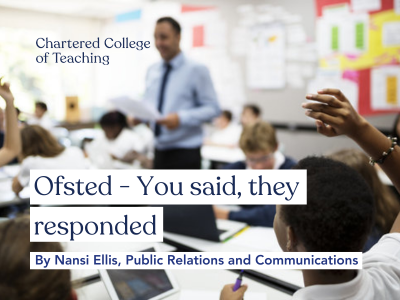When Ofsted consulted with the profession on their proposals for a new inspection system, we brought together a number of member focus groups, including with Sir Martyn Oliver, His Majesty’s Chief Inspector, so that your views could shape the direction. We invited them to make changes to five aspects of their new framework.
Now that they have published their response, how much did they listen?
1. You suggested a number of ways that they could improve clarity and focus. In response, they have:
- reduced the number of evaluation areas from 8 to 6, by combining areas so that we now have ‘curriculum and teaching’ and ‘attendance and behaviour’ rather than separate areas for each.
- reduced the number of standards within each grade, and ‘tightened’ the definition of the expected standard and strong standard grades. They will use a ‘secure fit’ (rather than a ‘best fit’) grading model, meaning that schools will have to meet every standard within a grade in order to meet it.
- acknowledged that it is not their role to define inclusion, and instead offered ‘their approach to inclusion’ which mentions children and learners who are disadvantaged, those with SEND, those known to social care and ‘those who may face other barriers to their learning and/or wellbeing’. It doesn’t specify protected characteristics, rendering them invisible.
They have not:
- changed the 5-point scale. They explicitly rejected a ‘met/not met’ scale (except for safeguarding), as giving too little information and nuance, they said a 3-point scale would put most schools on the middle grade, and a 4-point scale would be too similar to the current system. Parents appreciated the 5-point scale.
- considered moving the inspection of ‘safeguarding’ out of Ofsted’s remit – perhaps because the remit is set by DfE.
- considered providing a shorter, parent-facing report card alongside a more comprehensive school-facing report. Instead, a colour-coded report card will be available to all, with grading to help parents and a nuanced report explaining strengths and areas for development in each evaluation area for school improvement.
2. You recommended that they should specifically address bias in inspections. They have:
- said they will carry out an immediate evaluation of the framework and a rolling evaluation survey post-inspection. They will measure consistency through HMI shadow inspections, a desk-based study, and data. But they don’t specifically mention addressing bias.
- set out their approach to training and to quality assurance, including pilot inspections, and ‘shadowing, teaming and learning’. We hope this will help to ensure consistency in the inspection approach, but it’s not clear whether the quality assurance will consider issues of bias and fairness.
- set out an aim to match the expertise of Ofsted Inspectors with specific types of provision, with a specific reference to primary school inspections which will be led by inspectors with primary expertise. Where that’s not possible, there will be additional quality assurance measures.
3. You asked them to focus on process, not (just) outcomes. They have:
- set out in the inspection toolkits that ‘inspections focus on the impact of the systems and processes that leaders use to support the continuous improvement and effective running of the school’.
- explained how they will take context into account, starting an inspection with conversations about context with school leaders, adapting inspection to different types of providers and sharing data about context (eg FSM, SEND, performance and attendance data). The new ‘Ofsted: explore an area’ service is intended to show how a school’s performance sits within the local context.
- proposed plans for training to support inspectors to understand how to interpret contextual factors.
4. You said they should set an expectation for evidence-informed school cultures to improve schools.
- Inspector toolkits set an expectation for leaders to ensure that professional learning opportunities draw on the best available evidence including high-quality research and expert provision, that staff continually seek to improve their expertise, drawing on the best available evidence, and that leaders protect time for their own professional learning.
- The ‘expected standard’ for curriculum and teaching specifies that teachers have an evidence-informed understanding of effective teaching and how pupils learn.
- It is not yet clear how inspectors will be trained to ensure a nuanced understanding of high-quality evidence or its context-specific implementation.
5. You said they should recognise and address the high pressure the accountability system places on school leaders.
- They commissioned an independent wellbeing impact assessment of the revised Ofsted framework, which pulls together a range of evidence about the impact of inspection on workload and wellbeing, and the low level of trust in Ofsted. The report suggests a need to better understand the ‘stakes’ involved in inspection, focusing on the impact of a poor Ofsted judgement.
- While Ofsted’s response to the consultation reiterates that they ‘do not expect any provider to be doing more than it needs to just ‘for Ofsted’’, they have not set out plans to actively counter this perception and its impact on schools in-between inspections.
- They have set out an intention to co-develop the timetable and focus of inspection, which should continue the collegial approach that some schools have experienced. But the inspection timeframe is tight, which could lead to increased stress and potentially a less collaborative approach.
- They have removed the requirement for ‘deep dives’ which had a negative effect on schools with fewer specialist staff.
According to Teacher Tapp, most teachers are decidedly underwhelmed by the proposed changes. We might learn more about their impact from the pilot inspections currently underway.
Do you think the new framework will make a difference?





